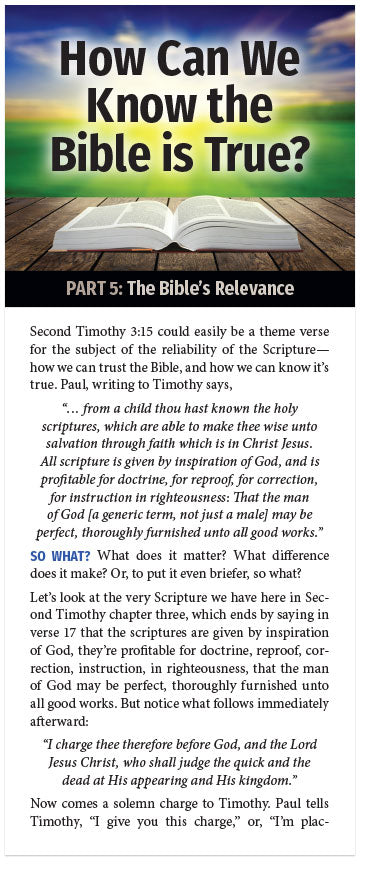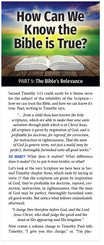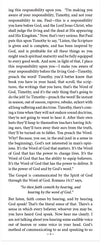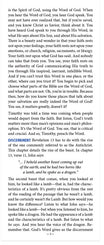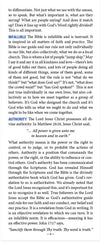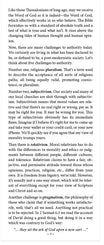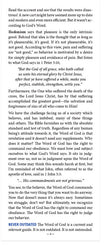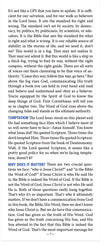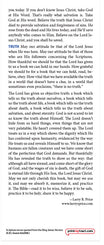How Can We Know The Bible Is True? (Part 5 of 5)
Special-Order Folded Flyer Tract
 NOTE: This item is custom-printed to order (click for more details).
NOTE: This item is custom-printed to order (click for more details).
This tract is from our print-on-demand library, and is not kept in stock. Select the options below, and we will custom-print a batch just for you. Because this item is custom-printed, you can add your custom imprint to the back page at no extra cost.
- Estimated shipping date: Friday, January 2 (Click for more details)
- SKU:
- Discounts: Discount coupons do not apply to this item
- Format: Folded Flyer Tract
- Size: 3.5 inches x 8.5 inches
- Pages: 8
- Imprinting: Available with 4 lines of custom text
- Version: KJV
- Returns: Because this item is custom-printed to order, it cannot be returned.
Show all item details
The full text of this flyer tract is shown below in the KJV version. (Do you want to print this tract in a different version than the one listed? Contact us and let us know what you're looking for—we may be able to create the alternate version for you at no charge.)
Second Timothy 3:15 could easily be a theme verse for the subject of the reliability of the Scripture—how we can trust the Bible, and how we can know it’s true. Paul, writing to Timothy says,
“… from a child thou hast known the holy scriptures, which are able to make thee wise unto salvation through faith which is in Christ Jesus. All scripture is given by inspiration of God, and is profitable for doctrine, for reproof, for correction, for instruction in righteousness: That the man of God [a generic term, not just a male] may be perfect, thoroughly furnished unto all good works.”
So what? What does it matter? What difference does it make? Or, to put it even briefer, so what?
Let’s look at the very Scripture we have here in Second Timothy chapter three, which ends by saying in verse 17 that the scriptures are given by inspiration of God, they’re profitable for doctrine, reproof, correction, instruction, in righteousness, that the man of God may be perfect, thoroughly furnished unto all good works. But notice what follows immediately afterward:
“I charge thee therefore before God, and the Lord Jesus Christ, who shall judge the quick and the dead at His appearing and His kingdom.”
Now comes a solemn charge to Timothy. Paul tells Timothy, “I give you this charge,” or, “I’m placing this responsibility upon you. “I’m making you aware of your responsibility, Timothy, and not your responsibility to me, Paul—this is a responsibility you have before God, and the Lord Jesus Christ, who shall judge the living and the dead at His appearing and His Kingdom.” Now, that’s very serious. But Paul puts this upon Timothy to say, “Listen, the Scripture is given and is complete, and has been inspired by God, and is profitable for all these things so you might reach spiritual maturity and be fully equipped to every good work. And now, in light of that, I place this responsibility upon you—I make you aware of your responsibility before the living God—Timothy, preach the word! Timothy, you’d better know that book you have in your hand, that scroll, the scriptures, the writings that you have, that’s the Word of God, Timothy, and it’s the only thing that’s going to do the job! So Timothy—preach the word! Be instant in season, out of season, reprove, rebuke, exhort with all long suffering and doctrine. Timothy, there’s coming a time when they will not endure sound doctrine, they’re not going to want to hear it. After their own lusts they’ll heap to themselves teachers having itching ears, they’ll turn away their ears from the truth, they’ll be turned on to fables. You preach the Word. Why? Because, you see, in the end (and in a sense in the beginning), God’s not interested in man’s opinions. It’s the Word of God that matters. It’s the Word of God that has the power to change lives. It’s the Word of God that has the ability to equip believers. It’s the Word of God that has the power to deliver. It is the power of God and by God’s word.”
The Gospel is communicated by the Spirit of God through the Word of God. Romans 10:17 says,
“So then faith cometh by hearing, and hearing by the word of God.”
But listen, faith comes by hearing, and by hearing God speak! That’s the literal sense of that. There’s a sense in which every believer, whoever you may be, you have heard God speak. Now hear me clearly. I am not talking about you hearing some audible voice out of heaven or some voice in your head. God’s method of communicating to us and speaking to us is the Spirit of God, using the Word of God. When you hear the Word of God, you hear God speak. You may not have ever realized that, but if you’re saved, and you know Christ as Savior, think about it. You have heard God speak to you through His Word, in what He says about His Son, and about His salvation. There is a beauty and wonder in that your faith rests not upon your feelings; your faith rests not upon your emotions, or church, religion, sacraments, or liturgy. Your faith rest upon what God has said. And nobody can take that from you. You see, your faith rests on the authority of God communicating His truth to you through His inspired, inerrant, infallible Word. And if you can’t trust this Word in one place, or the other, where can you trust it? You begin to pick and choose what parts of the Bible are the Word of God, and what parts are not. Oh, you’re in trouble. Because then, how do you know those places that talk about your salvation are really indeed the Word of God? You see, it matters greatly, doesn’t it?
Timothy was told a time was coming when people would depart from the faith. But listen, God’s truth matters more than man’s opinions and man’s philosophies. It’s the Word of God. You see, that is critical and crucial. And so, Timothy, preach the Word.
Discernment Revelation 13 has to do with the rise of the one commonly referred to as the Antichrist. This chapter details the rise of the beast. In chapter 13, verse 11, John says:
“… I beheld another beast coming up out of the earth; and he had two horns like a lamb, and he spake as a dragon.”
The second beast that comes, when you looked at him, he looked like a lamb—that is, had the characteristics of a lamb. It’s pretty obvious from the rest of the reading of the passage that he wasn’t a lamb, and he certainly wasn’t the Lamb. But how would you know the difference? Listen to what John says—he looked like a lamb—but when you listened to him, he spoke like a dragon. He had the appearance of a lamb and the characteristics of a lamb. But listen to what he says. And you hear the voice of the dragon. Remember that. God’s Word gives us the discernment to differentiate. Not just what we see with the senses, so to speak. But what’s important is, what are they saying? What are people saying? And does it match up? Does it line up with God’s Word rightly divided? This is all important.
Infallible The Bible is infallible and is inerrant. It is inspired in all matters of faith and practice. The Bible is our guide and our rule not only individually in our life, but also collectively, what we do as a local church. This is where a lot of people “jump ship.” May I say it and say it in all kindness and love—there’s lots of good folks out there, and lots of people doing all kinds of different things, some of them good, some of them not good, but the rule is not “what do we think?” but “what does God say?” It’s not, “what does the crowd want?” but “has God spoken?” This is not just true individually in our own lives, but also collectively as to how we meet together as a group of believers. It’s God who designed the church and it’s God who tells us what we ought to do and what we ought to be like when we come together.
Authority The Lord Jesus Christ possesses all divine authority. In Matthew 28:18, Jesus Christ said,
“… All power is given unto me in heaven and in earth.”
What authority means is the power or the right to control, or to judge, or to prohibit the actions of others. Authority is a position that commands the power, or the right, or the ability to influence or control others. God’s authority has been communicated through the Scriptures. God has revealed Himself through the Scriptures and the Bible is the divinely authoritative book which God has given. God’s revelation to us is authoritative. We already noted that the Lord Jesus recognized this, and it’s important for us to recognize it as well. True believers in the Lord Jesus accept the Bible as God’s authoritative guide and rule for our faith and our conduct, our belief and our practice. It is a revelation from God in writing. It is an objective revelation to which we can turn. It is an infallible norm. It is efficacious—meaning it has an effective power. John 17:17 says,
“Sanctify them through Thy truth: Thy word is truth.”
Like those Thessalonians of long ago, may we receive the Word of God as it is indeed—the Word of God, which effectively works in us who believe. The Bible furnishes us with a standard of absolute truth and a test of what is true and what isn’t. It rises above the changing tides of human thought and human opinion.
Now, there are many challenges to authority today. We certainly are living in what has been declared to be, or defined to be, a post-modernistic society. Let’s think about five challenges to authority.
Number one, religious pluralism. That’s a term used to describe the acceptance of all sorts of religious paths, all being equally valid, promoting coexistence, or pluralism.
Number two, subjectivism. Our society and many of our local churches are shot through with subjectivism. Subjectivism means that moral values are relative and that there’s no real right or wrong, per se. It may be right for you. It may be wrong for you. This type of subjectivism obviously has its immediate flaws. Imagine if I believe it’s right for me to come up and take your wallet or your credit card, or your new iPhone. We’ll quickly see if you agree that my view of morality trumps yours.
Then there is relativism. Moral relativism has to do with the differences in morality and ethics or judgments between different people, different cultures, and tolerance. Relativism claims to have a fair, objective, and permissive attitude toward those whose opinions, practices, religion, etc., differ from your own. It is freedom from bigotry, we’re told. However, it’s usually just a one-way street, which will be tolerant of everything except for your view of Scripture and Christ and so on.
Another challenge is pragmatism, the philosophy of those who claim that if something works satisfactorily, well, that’s all we need. Anything not practical is to be rejected. In 2 Samuel 6:3 we read the account of David doing a good thing, but doing it in a way which was contrary to God’s way:
“… they set the ark of God upon a new cart …”
Read the account and see that the results were disastrous! A new cart might have seemed more up to date and modern and even more efficient. But it wasn’t according to God’s Word.
Hedonism says that pleasure is the only intrinsic good. Behind that idea is the thought that as long as it’s pleasurable, it’s good. If it’s not pleasurable, it’s not good. According to this view, pain and suffering are “not good,” so behavior is motivated by a desire for simply pleasure and avoidance of pain. But listen to what God says in 1 Peter 5:10,
“But the God of all grace, who hath called us unto his eternal glory by Christ Jesus, after that ye have suffered a while, make you perfect, stablish, strengthen, settle you.”
Furthermore, the One who suffered the death of the cross, the Lord Jesus Christ, has by that suffering accomplished the greatest good—the salvation and forgiveness of sins of all who come to Him!
We have the challenge facing us of a society which believes, and has imbibed, many of these things and others. The Bible furnishes us with the absolute standard and test of truth. Regardless of any human being’s attitude towards it, the Word of God is that revelation and it doesn’t need any supplements. Why does it matter? The Word of God has the right to command our obedience. We must bow and subject ourselves to what God’s Word says. It sits in judgment over us, not us in judgment upon the Word of God. Some may think this sounds harsh at first, but I’m reminded of what John, often referred to as the apostle of love, said in 1 John 5:3:
“… His commandments are not grievous.”
You see, to the believer, the Word of God commands you to do the very thing that you want to do anyway. Now that doesn’t mean it’s always easy. Sometimes we struggle, don’t we? But ultimately, we recognize that the Word of God has the right to command our obedience. The Word of God has the right to judge our behavior.
Never Outdated The Word of God is a current and relevant guide. It is not outdated. It is not outmoded. It’s not like a GPS that you have to update. It is sufficient for our salvation, and for our walk as believers in the Lord Jesus. It sets the standard for right and wrong. The standard isn’t set by society, by democracy, by politics, by politicians, by scientists, or educators. It is the Bible that sets the standard for what is right and what is wrong. It is our reliable source of stability in the storms of life, and we need it, don’t we? This world is in a fog. They may not realize it. They may not admit it. But this world is like a ship in a thick fog, trying to find its way, without the right compass, without the right guide. There are all sorts of voices out there clamoring to be that voice of authority. “Come this way, follow this way, go here.” But above the fog rises God, communicating His truth through a book you can hold in your hand and read and believe and understand and obey as a believer. You’re equipped by the Spirit of God to know the deep things of God. First Corinthians will tell you so in chapter two. The Word of God rises above the changing tides and stands as the ultimate authority.
Temptation The Lord Jesus stood on this planet and He had something face Him which I believe most of us will never have to face—Satan himself. You know what Jesus did? He quoted Scripture. Three times the devil tempted Him. Three times He quoted Scripture. He quoted Scripture from the book of Deuteronomy. Well, if the Lord quoted Scripture, it seems like a pretty good policy for us when we’re facing temptation, doesn’t it?
Why Does it Matter? There are two crucial questions we face: “who is Jesus Christ?” and “is the Bible the Word of God?” If Jesus Christ is who He said He is, the Bible is indeed the Word of God. If the Bible is not the Word of God, Jesus Christ is not who He said He is. Both of those questions really hang together. That’s why it’s so important. That’s why it ultimately matters. If we don’t have a communication from God in this book, the Bible, His Word, then we don’t know who Jesus Christ is. But we do have this communication. God has given us the truth of His Word. God has given us the truth concerning His Son, and His Son attested to the fact that this Bible is indeed the Word of God. That’s the most important message for you today. If you don’t know Jesus Christ, take God at His Word. That’s really what salvation is. Take God at His word. Believe the truth that Jesus Christ died to provide salvation and forgiveness of sins. He rose from the dead and He lives today, and He’ll save anybody who comes to Him. Believe on the Lord Jesus Christ, and you shall be saved.
Truth May our attitude be that of the Lord Jesus when He was here. May our attitude be that of those who are His followers concerning the Scriptures. How thankful we should be that the Lord has given to us a book we can hold in our hands. How grateful we should be for a book that we can hold, read, believe, obey. How vital that we have available the truth in a world that doesn’t have a clue, in a world that sometimes even proclaims, “there is no truth.”
The Lord has given us objective truth: a book which tells us the truth about ourselves, a book which tells us the truth about life, a book which tells us the truth about death, a book which tells us the truth about salvation, and about eternity. God is not scared to let us know the truth about Himself. The Lord doesn’t hide from us hard things, even things that are not very palatable; He hasn’t covered them up. The Lord treats us in a way which shows the dignity which He has conferred upon humanity, evidenced by the way He treats us and reveals Himself to us. We know that humans are fallen creatures and we have come short of the perfection that God demands. But thankfully He has revealed the truth to show us the way: that although all have sinned, and come short of the glory of God, and the wages of sin is death, the gift of God is eternal life through His Son, the Lord Jesus Christ. May we not only cherish this book, but may we use it, and may we absorb it, memorize it, and practice it. The Bible—read it to be wise, believe it to be safe, practice it to be holy, share it to be happy.
—Larry R. Price
www.larryrprice.com

